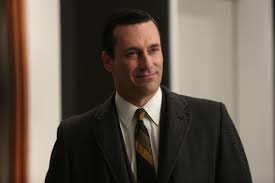
Episode 13 of season six of Mad Men ends in two definitive ways. First, Don Draper gets his long-awaited comeuppance at the hands of the suddenly, if not surprisingly, united SC&P. He's asked to take a two-month break to get his act together (read: he's fired). Then Duck, the recovering alcoholic headhunter low-life, is seen escorting up Lou Avery, the new corporate everyman (Pete's replacement? Don's?), as Don prepares to take the elevator down, perhaps never to return again.
Secondly, the episode officially ends with Don showing his children the outside of the Pennsylvania whorehouse where he grew up. They aren't told it was a whorehouse. However, the forlorn, yet numbed, child sucking on a red bomb pop on the porch of the tall decrepit structure indicates that Dad's here-to-fore secret upbringing was not a bed of roses. This causes a moment of profound awakening in Don's troubled daughter, Sally, who finally appreciates both how lucky she is and that her own boarding school rebellion jig is up.
The deck chairs have been rearranged on the Battleship America, but the long-telegraphed death of advertising -- when creative geniuses like Don Draper dominated -- has become a fact. Sure, advertising will soldier on, happily so, and certainly profitably so (profits come to all endeavors once they've grown beyond their ribald and edgy heyday), but no longer with the same world-historical importance. Peggy now takes Don's place in the Creative Director's seat, as her office sweetheart and Don's former and far less talented creative director antagonist, Ted, is moved out to L.A. to restore harmony with his family (and get his own head back in the ad game free of his Peggy obsession). Roger, Don's putative buddy inside the agency, turned on Don in the end. It is the first moment in this long series when one starts to hate the beguiling quick-witted Roger Sterling for all the same reasons that almost everyone else hates him. He's a self-serving, cowardly dick.
And it becomes clear that the real winners in this new America -- with the possible exception of Peggy -- are those without creative talent, but with an uncanny facility for corporate survival (Jim Culter's fortuitous decision to let the agency be changed to Sterling, Cooper and "Partners" now has special resonance). Mr. Capable, the cartoonishly affable Bob Benson continues his improbable, deceptive rise, first befuddling Pete Campbell (who continues his implosion right in front of the Chevy execs) and then disarming Roger Sterling (who, for all his Machiavellian smoothness, can't quite fathom how Bob pulls off his nice-guy shtick with such aplomb) and now buxom boardroom-gal-on-the-rise Joan Harris too (who should know by now not to bond with psychos after her first turn around that rough block, except that she needs a dependable man around her single-mom home to cut the turkey).
In short, the decision has been made that in the new world of advertising, the personal excesses of genuine auteurs -- who draw from a well of profound personal experience for their catchy advertising epiphanies -- can no longer be tolerated. It's bad for business.
It's, thus, only fitting that Don exits stage left, since he himself has seen how his entire advertising career has been about putting Belle Jolie lipstick on the ugly truths of a system that Don previously said was "rigged." The sensitive kid born to a prostitute mother who died in childbirth and then later raised in a whorehouse, finally sees, once he's finally put down the bottle in earnest, that when there is authenticity, there's no need for advertising to clutter the relationship between product and consumer. Just as there's no longer a need for Don to hide his past from his ex-wife and kids. In fact, there's no other choice, if one is to survive, except to be honest about who one is and from where one came.
Don's epiphany actually begins to play out slightly earlier in the episode before the shocked countenances of his would-be former partners, as Don first tells the Hershey's execs the fictitious story of how his Dad rewarded him with a Hershey's candy bar as a kid. But then Don -- after seeing his hand shake now that's he's gone cold turkey -- realizes that the game is up. Like Denzel Washington in Flight when speaking before the FAA about the plane crash that happened on his watch while piloting drunk, Don decides to come clean about his orphan upbringing. In a pitch meeting no less. And the second story he tells to the Hershey executives is so real, so moving, and so heartbreaking, it is without a doubt the greatest bit of acting done by Jon Hamm in this entire series. Basically, Don tells the Hershey executives that they don't need advertising. Their product sells itself because it is good, because it is genuine, and because it satisfies the yearning in us all for "love."
Matt Weiner does not end this season with a bang, but a whimper. But what a whimper. Almost as if reading straight from a critique of democracy by Nietzsche or Plato, Weiner is slyly saying, "when a nation kills off the rare and confounding creative auteur in the interest of Nixonian normalcy and corporate comfort, that nation is in decline." Roger Sterling that, my friend.
See you next year when hopefully the united family life that Don has longed for becomes a reality when he and Betty officially reunite, as the daft, career-obsessed, and spiritually shallow Megan is finally shown the door.